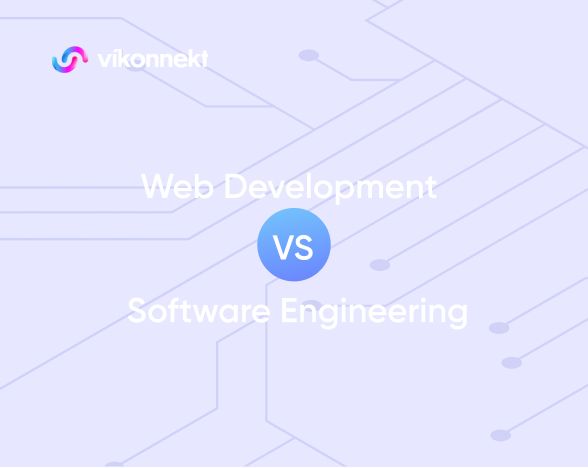The technology landscape is vast and constantly evolving, with new roles and specialisations emerging as industries adapt to digital transformation. Web developers and software engineers are among the most sought-after professions in this space.
Though often used interchangeably, these roles have distinct functions, skill sets, and career paths. Understanding the difference between web developers and software engineers is crucial for businesses looking to build effective teams and individuals aspiring to forge successful careers in tech.
In this comprehensive guide, we’ll explore the key distinctions between web development and software engineering, the specific skills required for each role, and how to choose the right career path based on your interests and strengths.
We’ll also discuss how these roles can collaborate effectively within an organization like Víkonnekt to deliver robust, scalable solutions for both public and private sector clients.
Understanding Web Development and Software Engineering
Web development and software engineering are fundamental pillars of the tech industry, each contributing uniquely to the creation of digital products and services.
To fully grasp the differences, it’s essential to start with a clear understanding of what each role entails.
What is Web Development?
Web development refers to the process of building and maintaining websites and web applications that run on internet browsers. It involves a combination of coding, design, and problem-solving to create interactive and user-friendly digital experiences.
Web development can be broken down into three primary areas:
1. Frontend Development:
This is the client-side aspect of web development, focusing on what users see and interact with. Frontend developers use languages like HTML, CSS, and JavaScript to design and build the layout, structure, and aesthetics of a website.
They also ensure that the site is responsive, meaning it functions well on various devices and screen sizes. Frontend development requires a keen eye for design, an understanding of user experience (UX), and the ability to translate visual concepts into functional code.
2. Backend Development:
Backend developers work on the server-side of web applications. They are responsible for building the infrastructure that supports the frontend, including databases, servers, and application logic.
Backend developers typically use languages such as Python, Ruby, PHP, and Java. They ensure that data is stored, retrieved, and displayed correctly on the frontend, enabling functionalities like user authentication, data management, and content delivery.
3. Full-stack Development:
Full-stack developers have expertise in both frontend and backend development. They are versatile professionals capable of building entire web applications from the ground up.
Full-stack development requires a broad skill set, including knowledge of frontend frameworks (like React or Angular) and backend frameworks (such as Django or Express).
Full-stack developers can handle all aspects of web development, making them valuable assets to any project team - think of them as the web developer embodiment of Captain America summoning the other Avengers (front-end and back-end development).
What is Software Engineering?
Software engineering is a broader field that encompasses the design, development, and maintenance of software systems.
Unlike web development, which is primarily concerned with creating websites and web applications, software engineering covers all types of software, including desktop applications, mobile apps, embedded systems, and large-scale enterprise solutions.
Software engineering involves applying engineering principles to software creation, ensuring that the final product is reliable, efficient, and scalable. Key areas within software engineering include:
1. Application Development:
This involves creating software applications for various platforms, including desktop, mobile, and web. Application developers use languages such as Java, Swift, and C++ to build programs that perform specific tasks, like word processing, gaming, or data analysis.
Application development requires a deep understanding of user needs and the ability to design intuitive, high-performance software.
2. Systems Programming:
Systems programmers work at a lower level, designing and maintaining the software that interacts directly with hardware components, such as operating systems and network protocols.
This type of programming requires knowledge of low-level languages like C and assembly, as well as a deep understanding of computer architecture and operating system concepts.
3. DevOps Engineering:
DevOps is a combination of development and operations, focusing on improving the software development lifecycle through automation, continuous integration, and continuous deployment (CI/CD).
DevOps engineers work to streamline processes, reduce manual effort, and ensure that software is delivered quickly and reliably. They use tools like Docker, Kubernetes, and Jenkins to manage software builds, testing, and deployment.
3. Embedded Systems Engineering:
Embedded systems engineers develop software for devices that are not traditionally thought of as computers, such as IoT devices, automotive systems, and consumer electronics.
This type of engineering requires a strong understanding of hardware-software integration and often involves programming in C or C++ to optimise performance and resource usage.
Software engineers work on a diverse array of projects, ranging from small applications to complex, distributed systems. Their work often involves designing algorithms, optimising performance, and ensuring the robustness and security of software products.
What Are the Main Differences Between Web Development and Software Engineering?
Although web development and software engineering share some commonalities, they are distinct fields with different responsibilities, skill sets, and career trajectories. Let’s delve into these differences in more detail.
Responsibilities
Web developers are primarily focused on the user-facing aspect of a product. Their responsibilities include designing website layouts, writing code, testing site functionality, and optimising for performance.
They work closely with designers and content creators to ensure that the website or application provides a seamless user experience.
In addition to coding, web developers may also be involved in content management and search engine optimisation (SEO) to enhance the site’s visibility and usability - for many web developers, however, SEO can be an Alien world, and content management is whoever loses a game of rock, paper, scissors.
Software engineers, on the other hand, have a broader scope of responsibilities. They may work on the development of software applications, systems, or even entire networks.
Their work involves detailed planning, designing algorithms, managing databases, and ensuring that the software meets performance and security requirements.
Software engineers often collaborate with product managers, quality assurance (QA) teams, and other stakeholders to deliver a product that meets both technical specifications and user needs.
Coding Languages
The choice of coding languages is one of the most noticeable differences between web developers and software engineers.
Web developers typically use languages and technologies tailored to building web applications. For frontend development, they rely on HTML, CSS, and JavaScript, often using libraries and frameworks like React, Angular, or Vue.js.
For backend development, common languages include Python, PHP, Ruby, and JavaScript (with Node.js). They also use databases like MySQL, MongoDB, or PostgreSQL to store and manage data. And, don’t worry, 99% of them can also communicate with humans as well.
Software engineers work with a wider range of programming languages, depending on the type of software they are developing. They might use Java, C++, Python, or Go for application development and systems programming.
For embedded systems or performance-critical applications, they may use C or Rust. Their choice of language is influenced by factors such as system requirements, performance needs, and the specific application domain.
Education
The educational paths for web developers and software engineers also differ.
Web development can often be self-taught, with many professionals learning through coding bootcamps, online courses, or independent study.
While a formal degree in computer science or a related field can be beneficial, it is not always necessary. A strong portfolio showcasing completed projects and a deep understanding of web technologies are often more important for landing a job.
Software engineering typically requires a more formal educational background, usually a bachelor’s degree in computer science, software engineering, or a related field.
This formal education provides a solid foundation in computer science principles, algorithms, data structures, and software design.
Advanced roles, particularly in research or specialized fields like AI or cybersecurity, may require a master’s degree or even a Ph.D.
Certification
Certifications can enhance credibility in both web development and software engineering but are not always essential.
Web developers may pursue certifications in specific frameworks or technologies, such as React, AWS (Amazon Web Services), or Google Analytics, to validate their skills and improve their job prospects.
Certifications can be particularly valuable for freelancers or those looking to specialise in a specific area.
Software engineers, on the other hand, may seek certifications in areas like cloud computing (e.g., AWS Certified Solutions Architect), cybersecurity (e.g., Certified Information Systems Security Professional - CISSP), or project management (e.g., Certified ScrumMaster - CSM).
These certifications demonstrate expertise in specific areas and can be crucial for roles that require specialised knowledge.
Development Tools
Both web developers and software engineers rely on various tools to streamline their work and improve productivity.
Web developers use a range of tools specific to building and optimising websites. These include code editors like Visual Studio Code or Sublime Text, version control systems like Git, and content management systems (CMS) like WordPress or Shopify.
They also use tools like Chrome DevTools for debugging and performance optimization, and platforms like Netlify or Vercel for deployment.
Whereas software engineers often use integrated development environments (IDEs) like IntelliJ IDEA, Eclipse, or Visual Studio for large-scale software projects.
They also rely on tools for software testing, debugging, and version control, ensuring the code they write is efficient and bug-free. Tools like JIRA and Confluence are commonly used for project management and documentation.
Average Salary Expectations
Now “show me the money!” we hear you crie.
Salaries for both web developers and software engineers vary widely based on factors such as experience, location, and the specific industry.
Salaries for both web developers and software engineers vary widely based on factors such as experience, location, and the specific industry.
Web developers typically have a wide range of salary expectations.
Entry-level positions or freelance gigs may offer lower compensation, but experienced developers, particularly those with expertise in frontend frameworks or backend technologies, can command competitive salaries.
According to industry reports, the average salary for web developers in the United States is around $75,000 - $80,000 per year (at the time of writing), but this can vary significantly based on location and experience.
Alternatively, software engineers, on average, tend to earn higher salaries due to the complexity and scope of their work. The average salary for software engineers in the United States is around $110,000 per year, with senior engineers and those in specialised fields (like machine learning or cybersecurity) earning substantially more.
The demand for software engineers is high across industries, from tech giants to startups, contributing to competitive compensation packages - this is a similar trend in our home country of Iceland also (but, we won’t confuse you with the currency mashup!)
What Should You Consider When Choosing Between Web Development and Software Engineering?
Choosing between a career in web development and software engineering involves evaluating your personal interests, strengths, and career goals. Here are some key factors we recommend considering:
Personal Interests and Strengths
If you enjoy creating visually engaging websites and have a passion for design, user experience, and interactivity, web development may be the right path for you.
It requires creativity, attention to detail, and a good understanding of how users interact with digital content.
On the other hand, if you are drawn to problem-solving, algorithm design, and building complex systems, software engineering might be a better fit.
It requires analytical thinking, a solid grasp of computer science fundamentals, and the ability to work on large-scale software projects.
Future Growth Opportunities
Both fields offer significant growth opportunities, but the paths differ.
Web developers can specialize in areas like frontend development, UX design, or backend systems and move into roles such as technical lead or product manager.
They can also branch into related fields like digital marketing or e-commerce - joining the often necessary evil of marketing (just joking!)
Software engineers have a broad range of career options, from advancing into senior engineering roles and systems architecture to management positions like CTO.
They can also specialise in high-demand fields such as AI, data science, or cybersecurity, which offer strong job security and high earning potential - the better avenue for a nicer cheese board in the cold winter evenings ahead!
Current Job Market
The demand for both web developers and software engineers is robust, but it varies by region and industry.
Web development skills are essential for businesses looking to establish or enhance their online presence, particularly in industries like retail, media, and education.
Software engineering roles, especially in specialised areas like AI, data science, and cybersecurity, are experiencing rapid growth.
These roles are in demand across various industries, including healthcare, finance, and technology, offering diverse career opportunities (basically all of the sectors we accommodate - just saying).
Pay and Remuneration Options
Web development roles range from freelance projects to full-time positions, offering flexibility in terms of work arrangements and contract opportunities.
Freelancing can be lucrative for developers with a strong portfolio and specialised skills, while full-time roles provide stability and benefits.
Software engineers typically work in full-time roles with structured compensation packages, including benefits, stock options, and bonuses.
The pay structure reflects the complexity and impact of their work, and there is often more room for negotiation and advancement in larger organisations.
So What Does Víkonnekt Focus On?
At Víkonnekt, our team of software engineers plays a pivotal role in delivering advanced technology solutions across diverse industries.
From AI consulting and custom development to seamless integration and optimization, they apply their expertise to design and integrate AI solutions tailored to each client’s unique needs.
Our engineers specialise in areas such as machine learning, natural language processing, and data engineering, providing end-to-end support that covers everything from strategy and planning to execution and ongoing optimisation.
Whether developing custom AI models, enhancing enterprise software, or integrating complex backend systems, our engineers focus on creating scalable, high-performance solutions.
They ensure seamless data flow, secure infrastructures, and efficient system architecture, supporting clients in sectors ranging from finance and healthcare to energy and public services.
With a commitment to innovation and practical results, our team helps organizations harness the full potential of advanced technology to drive growth and operational excellence - we don’t like blowing our own trumpet, but we have a pretty awesome team!
Conclusion
Both web developers and software engineers play critical roles in the tech ecosystem, each bringing distinct skills and perspectives to the development process. Understanding the differences between these roles can help businesses make informed hiring decisions and professionals choose a career path that aligns with their skills and ambitions.
At Víkonnekt, we majorly harness the strengths of software engineers, to deliver purpose-driven solutions that elevate our clients’ digital presence and operational efficiency through AI. If you’re a organisation looking to integrate AI into your business soon, then don’t hesitate to sign up for a free discovery call with a member of our team.









